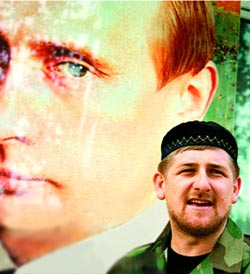
Kadyrov’s Challenges: Rebels, Russian Generals, and the Yamadaev Brothers
Publication: North Caucasus Weekly Volume: 9 Issue: 24
By:

“Ramzan Kadyrov, 31, has been Chechnya’s leader for a year. During that time, he has managed to silence dissent, pacify the Russian republic and embark on a massive reconstruction campaign. His critics are hard to find, because they have a habit of disappearing.” So wrote an American journalist recently in a leading U.S. newspaper (Los Angeles Times, June 18). However, the journalist’s description of Kadyrov seems to be already out of date. Kadyrov could be called “a brutal dictator” several months ago, but not now, given that his image as the all-powerful Chechen leader is falling to pieces.
Kadyrov had never had so many serious challenges to his power as he has now. Everything is going against him, with the local insurgency and the Yamadaev brothers, his rivals in the pro-Russian Chechen camp, presenting ever greater challenges. More importantly, Kadyrov seems to have lost trust in the eyes of top Russian military leaders and perhaps Russian political leaders as well.
The statement made by General Vladimir Shamanov—who heads the Russian Armed Forces’ Main Directorate for Combat Training and Service—that the Vostok and Zapad battalions will be left intact (see Chechnya Weekly, June 12) can be seen as a setback for Ramzan Kadyrov. Moreover, the influential Russian general went on to say that Sulim Yamadaev, Kadyrov’s number one rival, would remain the commander of the Vostok battalion. “Nobody plans to disband the Vostok and Zapad battalions,” Vladimir Shamanov told the newspaper Gazeta. “I have an order to train its personnel and I have no information that anybody plans to suspend Yamadaev” [as Vostok commander] (Gazeta, June 16). The general also promised to strengthen the Vostok battalion by adding experienced Russian officers. One of the Vostok fighters told the newspaper that a month ago a group of Russian officers came to Chechnya to train the battalion. “Russian officers teach us to fight in the mountains,” the fighter added.
The aim of the Russian generals simply to improve the fighting capabilities of the Vostok battalion would not be a threat to Kadyrov’s absolute power if the Yamadaev brothers were not at the same time manifesting their political ambitions. According to Gazeta, Sulim Yamadaev wants to establish a website for the Vostok battalion “to break through the information blockade around the unit.” The website will be a part of a TV and radio company that was set up by Isa Yamadaev, one of the Yamadaev brothers (Gazeta, June 16).
The website could be just the beginning: the Yamadaevs may try to set up a real TV or radio station that will broadcast in Chechnya from the battalion’s base. If that happens, it will mean the appearance of another political center in the Chechen Republic—one which will be independent of Ramzan Kadyrov but at the same time have support from Moscow. It will mean the end of Kadyrov’s political monopoly in Chechnya.
Kadyrov is trying his best to persuade the Russian authorities to stop supporting the Yamadaev brothers. In late May, Vladimir Ustinov, the newly appointed Russian presidential envoy to the Southern Federal District, visited Chechnya, where he discussed with Kadyrov ways to improve the regional economy and to make the local population support the Russian authorities rather than the insurgents. Ramzan Kadyrov arranged several meetings between Ustinov and delegations of Chechen civilians living in the republic’s lowlands and mountainous areas. Just a week before Ustinov’s visit to the republic, relations between the Chechen president and the Russian military command seriously deteriorated following an interview in which Major General Nikolai Sivak, the commander of the Combined Group of Forces in the North Caucasus, said that the Chechen population still supported the rebels, claims that were fiercely denied by members of Kadyrov’s staff (see Chechnya Weekly, May 22 and 29). Kadyrov’s main aim was to demonstrate to Ustinov that the Russian generals, not the Chechen Republic administration, should be blamed for failures of the Kremlin’s policy towards Chechnya. During Ustinov’s meeting with the Chechen civilians, the latter complained that Russian military units interfere in the civilian life of the locals. The civilians complained that the military set up mines on their fields and grasslands, occupy conservation areas, destroy Chechnya’s wildlife and so on (Regions.ru, May 29).
Prior to Ustinov’s departure from Chechnya, he and Kadyrov visited the base of the 46th Special Brigade of the Interior Forces, which has two Chechen battalions, Sever (North) and Yug (South), whose commanders are loyal to Kadyrov. In doing so, the Chechen president wanted to show off what he considers the real force capable of fighting the insurgency. After Shamanov made his statement on the fate of the Vostok battalion, Kadyrov’s client, Chechen parliamentary speaker Dukvakha Abdurakhmanov, said that he would like to invite Shamanov and Sergei Makarov, the newly appointed commander of the North Caucasian Military District, to visit Chechnya to see for themselves the difference between, as Abdurakhmanov put it, “the model 46th Motor Rifle Brigade and the 42nd division of the Russian army that incorporates the notorious Vostok battalion” (Regnum, June 11).
Ustinov and the Kremlin may be happy to let Kadyrov do what he wants as long as Chechnya remains quiet—to help the Chechen president get rid of all his political rivals and withdraw the bulk of Russia’s troops from Chechnya—but there is no guarantee that Ramzan Kadyrov can really stop the insurgency in the republic. The Russian generals support the Yamadaev brothers and the Vostok battalion not because they like them, but because they are desperately looking for ways of stopping the new rise of the Chechen insurgency. How can Kadyrov promise to control Chechnya if he cannot even defend Benoi, the village that is the center of his clan, the Benoi teip? Last week a group of rebels entered Benoi and burned the houses of policemen and officers loyal to Kadyrov. The Chechen president failed to respond and only promised monetary compensation to the victims of the rebel raid. At a meeting of Chechen officials that took place in the local capital Grozny on June 18, Ramzan Kadyrov promised that if necessary, he would put on camouflage, take an assault rifle and go to the mountains to fight the rebels by himself (Interfax, June 18). This sounds like hysteria and suggests that Ramzan is losing his confidence, and in Chechnya, the loss of confidence means the loss of power.




